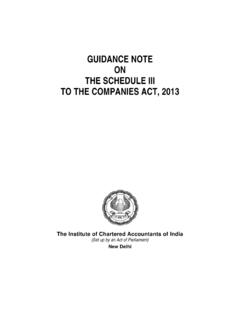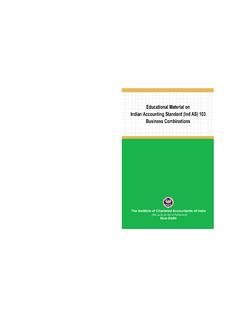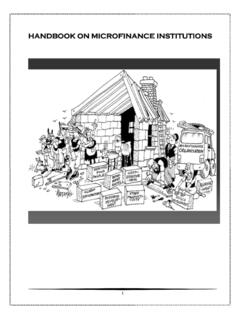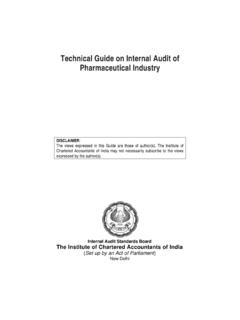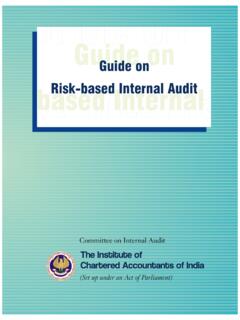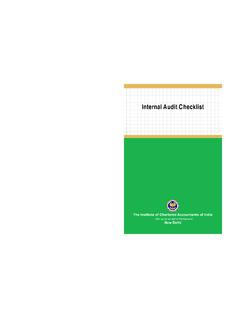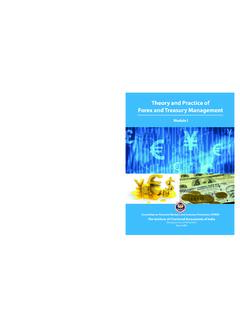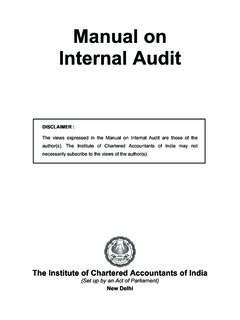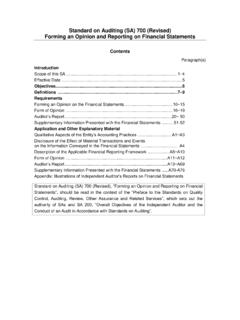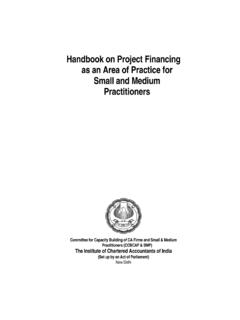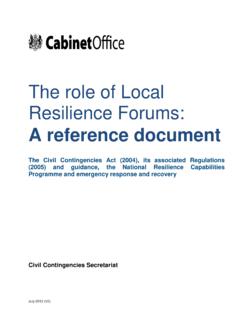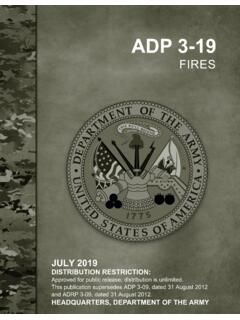Transcription of Accounting Standards - ICAI Knowledge Bank
1 Compendium ofAccounting Standards ( Accounting Standards as on july 1, 2017)The Institute of Chartered Accountants of IndiaNew Delhi The Institute of Chartered Accountants of IndiaAll rights reserved. No part of this publication may be reproduced, storedin a retrieval system, or transmitted, in any form, or by any means,electronic, mechanical, photocopying, recording, or otherwise withoutprior permission, in writing, from the of Publication:2017 Committee/Department: Accounting Standards 650/- (with CD)ISBN:978-81-88437-90-0 Published by:The Publication Department on behalf ofthe Institute of Chartered Accountants ofIndia, ICAI Bhawan, Post Box No.
2 7100,Indraprastha Marg, New Delhi - 110 by:Sahitya Bhawan Publications, HospitalRoad, Agra - 282 ,000 CopiesForewordFinancial statements are intended to meet common information needs of awide range of users including shareholders, bankers, potential investors,creditors, regulators and public at large. Accounting Standards can beviewed as standarised language of business to communicate high qualityinformation in financial statements based on principles of transparency,consistency and also comparability and reliability. Accounting standardsare a set of principles which entities follows while preparing the financialstatements providing a standardised way of describing the entity s financialposition and financial performance.
3 The Institute of Chartered Accountantsof India (ICAI), being the premier standard-setting body in the country,has constituted Accounting Standard Board (ASB) on 21st April, 1977,with the objective to formulate Accounting Standards to enable the Councilof ICAI to establish a sound and robust financial reporting standardsframework in India. While formulating Accounting Standards , ASB isexpected to keep in mind applicable laws, existing usages and economicenvironment in India. ASB shall also take into consideration thedevelopments at international level in the Accounting Standards setting areaso that the national Standards are aligned with prevailing global accountingprinciples and ICAI and ASB have been relentlessly working to ensure that the fastgrowing emerging economy of India is equipped with high qualityaccounting Standards comparable to the best of best in the world.
4 Therehave been significant changes in the legal framework and accountingstandards since the last edition of Compendium of Accounting are arrival of new set of Accounting Standards called IndianAccounting Standards (Ind AS) for a certain categories of companies,changes in the format of financial statements under the Companies Act,2013, path breaking reforms in Accounting standard relating to fixed Accounting Standards issued by the ICAI are applicable for the entitiesother than companies and are aligned with Accounting Standards notifiedby the MCA with certain differences. Accordingly, I am glad to note thatthe Accounting Standards Board has rightly recognised the need for updatedversion of the Compendium of Accounting Standards as on july 1, 2017 inthe interest of prepares and auditors of financial would like to congratulate CA.
5 S. B. Zaware, Chairman, AccountingStandards Board, CA. Vijay Kumar, Vice-Chairman, AccountingStandards Board and other members of the Board who have contributedimmensely on various activities of the Board and coming out with am confident that this edition of the Compendium would be immenselyuseful to the Accounting professionals as well as others concerned inpreparation of financial DelhiCA. Nilesh S. VikamseyJuly 1, 2017 PresidentPrefaceI have great pleasure and pride in writing preface to this edition of theCompendium of Accounting Standards prepared and published in the yearwhen the Accounting Standards Board (ASB or the Board) is celebratingits 40th anniversary (21st April 2017).
6 Financial Accounting and reporting remains the core tool of entities forcommunication with its stakeholders. Accounting Standards are the grammarof language used by entities in such communication. The subject ofaccountancy and its importance has a long history in India a treatiseon economics and political science titled Kautilya s (also known asChanakya) Arthshasthra , has elaborate prescriptions on Accounting aspectsfor a government which have features of universal utility. In line with theevolution and changes in the economies and society, financial reportingand Accounting Standards have also evolved and witnessed path breakingreforms.
7 Globalisation of economies and highly interconnected world hashad far reaching changes impact in this area. Since the beginning 21stcentury, there is renewed demand for global harmonisation of accountingstandards and urge to converge or adopt single set of high quality standardsthat require transparent and comparable information in the financialstatements. There is also a significant transformation in the fundamentalaccounting principles and concepts such as greater acceptance of fair valuemeasurements, prominence to fair and faithful presentation, new componentsin financial statements and so on. Accounting standard-setting directionhas shifted towards Principles based Standards rather than PrescriptiveRule based ones.
8 Of course, there are two other major developmentsimpacting standard-setting unprecedented global financial crisis startingin 2007-08 and birth of integrated reporting framework having core objectiveof more effective communication with stakeholders. Policy makers andRegulators are following the developments in standard-setting area withkeen interest. Therefore, Accounting standard-setting role has assumedgreater responsibility and accountability in public Institute of Chartered Accountants of India (The ICAI) had rightlyrecognised the need for robust Accounting standard framework andestablished the Accounting Standards Board (ASB or the Board) way backon 21st April 1977 to enable the Council of ICAI to discharge its role ofstandard-setter in the Nation.
9 In its 40 years of existence, the Board hasachieved several milestones particularly formulation of Indian AccountingStandards and their implementation, formulation of Accounting Standards ,providing advice on incorporation of IAS/IFRS, reviewing and revisingthe Standards periodically in line with changing conditions and providinginterpretations/guidance on Accounting a global platform, our Nation s importance and relevance cannot beunderstated as a large fast growing emerging economy. Apart from nation smission to become economic superpower in the coming decades, it intendsto develop as Skill Capital of the world. In this context, the ASB of ICAIhas been making relentless efforts to reform and upgrade the accountingstandards framework that is comparable to the global best practices.
10 Nodoubt, by no means it is an easy task when the financial reporting worldand the businesses are evolving constantly at fast pace. However, it isimportant to bear in mind that One Size Fits All approach is no longerpragmatic and therefore, in India three sets of Accounting Standardssummarised as follows have been developed:(a) Indian Accounting Standards (Ind AS) converged with InternationalFinancial Reporting Standards (IFRS) and applicable for specifiedclass of companies as per MCA notification dated 16 February 2015.(b) Accounting Standards notified under Companies (AccountingStandards) Rules, 2006 for companies other than those following IndASs.
